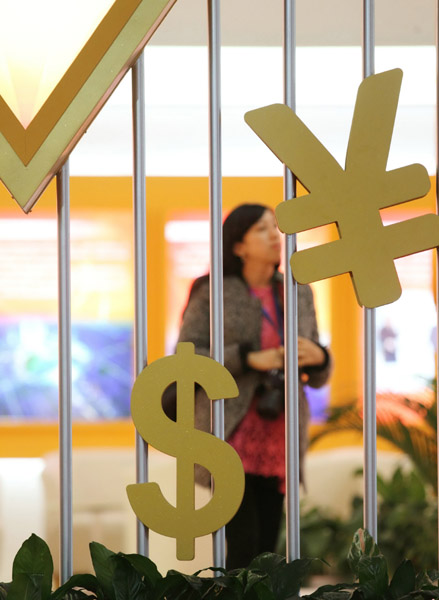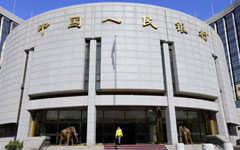|
 |
|
A visitor walks past currency signs at an international finance exposition in Beijing. The yuan has lost almost 2 percent since Feb 17, and had risen 34 percent against the dollar since its revaluation in 2005.?[Photo/China Daily] |
Fluctuations seen by some analysts as deliberate move by central bank
The yuan closed at an eight-month low against the dollar on Friday after a sharp mid-day dip. Economists said this volatility might signal the end of nearly a decade of gains for the currency.
|
 |
|
 |
Economists said the People's Bank of China might have orchestrated the recent volatility to prepare the market for another broadening of the yuan's daily trading band to 2 percent, against the current 1 percent.
The yuan closed at 6.1550 per dollar.
The move came as the PBOC set the daily reference rate 10 basis points higher on Friday at 6.1214.
Since Feb 17, the yuan has lost almost 2 percent. It had risen 34 percent against the dollar since its revaluation in 2005.
The currency has fallen repeatedly in the past two weeks. Many dealers said the depreciation is a deliberate move by the PBOC to target speculative funds betting on continued rises.
"The latest retreat was largely government-guided. The PBOC intervention reflects its desire to tame expectations of appreciation and counter hot money inflows as it prepares for band widening," Singapore's DBS Bank Ltd said in a research note on Friday.
Intervention, it added, does not reflect a fundamental policy shift toward weakening the currency.
Dariusz Kowalczyk, a Hong Kong-based economist with Credit Agricole CIB, wrote in a research note on Wednesday that a band of 1.5 to 2 percent may be established soon, possibly within weeks.
In a sign that the central bank is ready to fine-tune its foreign exchange policy framework, it started sounding out exporters on the impact of the recent depreciation.
Reuters quoted an anonymous employee at an exporter as saying that the company had received a phone call and an e-mail from the central bank seeking comment on the recent depreciation.
Ye Shuhui, a sales manager of Ningbo Jinfan Toy Co in Zhejiang province, told China Daily that he doesn't see any benefit for his company in the depreciation.
It means that future payments by customers won't be worth as much if the renminbi depreciates.
However, further appreciation of the yuan wouldn't be good news either, as it would indicate rising costs. "The ideal is for the yuan to remain stable," he said.
"Depreciation of the yuan may seem like good news. But few export-oriented companies can benefit from this instantly, because most orders were completed long ago," said Zhang Guanjin, general manager of Shaoxing Jinyong Textile Co Ltd in Zhejiang.
Australia and New Zealand Banking Group Ltd said in a report on Friday that although the PBOC will allow mild appreciation in the medium term to maintain its overall policy direction for a "generally stable" yuan, "the recent move has indicated the PBOC is willing to tolerate a more volatile market movement in the year ahead".
UBS AG's China economist Wang Tao said in a research note that the Chinese currency will largely trade at 6.1 yuan per dollar throughout the year amid wider fluctuations.
While welcoming the increased volatility, ANZ said encouraging capital outflow will be a better way to promote exchange rate flexibility.
For example, if the foreign exchange quota for residents was raised from the current $50,000 to $250,000 per year, there could be large capital outflows.
"The two-way flow of capital will naturally lead to volatility in exchange rates of the renminbi against major currencies," said ANZ.
Renminbi may become global reserve currency
PBOC clarifies rules on FTZ yuan business
Luxembourg wants bank for yuan deals
IFC to issue record yuan bonds in London
